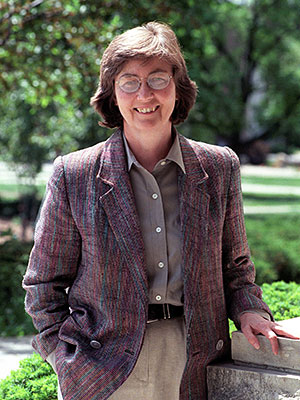 Gunda Georg
Gunda GeorgAfter receiving a degree in Pharmacy, Professor Georg earned her PhD in Medicinal Chemistry in 1980 from Philipps Universität Marburg, Germany. Subsequent to postdoctoral studies in synthetic organic chemistry at the University of Ottawa in Canada, she accepted a faculty position in the Department of Medicinal Chemistry at the University of Kansas. In 1999, she was named a Kansas U. Distinguished Professor. In 1997 she became the director of the Center for Drug Discovery at the Higuchi Biosciences Center, and in 1999 the director of the Kansas Cancer Institute’s Experimental Therapeutics Program. She served as the PI of a state-wide NIH-funded COBRE Center for Cancer Experimental Therapeutics, and she initiated and led the establishment of the U. of Kansas High Throughput Screening Laboratory. She is currently the P. I. of a large contract form the National Institute for Child Health and Human Development for the synthesis and testing of non-hormonal non-steroidal male contraceptive agents. In 2007 she moved to the U. of Minnesota, where she holds the Robert Vince Endowed Chair and the McKnight Presidential chair, serves as the Head of the Department of Medicinal Chemistry, and as the Founding Director of the Institute for Therapeutics Discovery and Development. The Institute has currently four core facilities, the HTS laboratory, the Lead and Probe Discovery Laboratory, the Medicinal Chemistry Core, and a scale-up laboratory for cGMP synthesis of active pharmaceutical ingredients.
Professor Georg has over 25 years of professional experience in drug discovery, medicinal chemistry, and organic chemistry. She has 490 publications and public presentations and has trained over 150 doctoral, postdoctoral, master, and undergraduate students in her laboratory in addition to carrying out classroom teaching at the graduate and undergraduate level. She is perhaps best known for her research with the anticancer agent taxol, the results of which have been published in more than 70 papers. She is the co-inventor of Lusedra, a highly water-soluble prodrug of the anesthetic propofol that was marketed in 2009 by Esai Pharma. She and her team have discovered Gamendazol™, a male contraceptive agent that is currently undergoing preclinical evaluation at the NIH (NICHD), at the U. of Kansas Medical Center, and in primates at the Oregon National Primate Research Center. Professor Georg is part of a team of researchers and clinicians at the U. of Minnesota that is planning on a phase I pancreatic cancer clinical trial with MinnelideTM, a natural product derivative that was prepared in her laboratory.
Professor Georg has worked on a variety of drug classes, such as anticancer agents, beta-lactam antibiotics, spasmolytic agents, antileprotic agents, antispermatogenic, and neuroprotective agents. Areas of expertise in organic chemistry include natural product chemistry, heterocyclic chemistry, beta-lactam chemistry, synthetic methodology, conformational studies, and combinatorial chemistry. In organic synthesis, her expertise ranges from the total and semi-synthesis of natural products (e.g., thienamycin), (-)-salicylihalamide A, oximidines, cryptophycin, epothilones, and indolizidine and quinolizidine alkaloids, to synthetic methods development. Almost all of Professor Georg’s research has been carried out in collaboration. During the course of these collaborations, an emphasis was placed on the design and synthesis of analogues of target compounds to explore structure-activity relationships, improve potency, selectivity, pharmaceutical and pharmacological properties, and to identify and map interactions between small molecules and proteins by preparing and using chemical probes.
She is a frequent reviewer for the National Institutes of Health, has been active in the ACS Division of Medicinal Chemistry and serves on six editorial boards of journals. She has received recognition for her work with awards, such as the Sato Memorial Award of the Pharmaceutical Society of Japan, the McKnight Presidential Chair at the University of Minnesota, the Nolan and Gloria Sommer Award of the University of Nebraska, the University of Kansas Higuchi-Endowment Research Achievement Award and has been elected an AAAS fellow.
Her first lecture presented on Monday April 11th 2010 was titled:
Drug Discovery in the Academy: Opportunities and Challenges
The lecture will provide a general overview of the process of drug discovery and development and discuss the challenges encountered in academic drug discovery efforts. The existing research infrastructure and plans to enhance the long-term strategic goals to develop a sustainable translational drug discovery and development infrastructure at the University of Minnesota will be reviewed. Some specific academic drug discovery projects will be described such as MinnelideTM, a natural-product derived anticancer agent, that was designed and prepared in the Georg group and that is under preclinical development at the University of Minnesota.
Her second lecture presented on Tuesday April 12th 2010 was titled:
Synthesis and evaluation of phenanthropiperidine alkaloids for anticancer activity and neurological side effects
We have recently developed a method for the construction of cyclic enaminones from readily available β-amino acids and methods for the direct C-3 arylation.1,2 The development of these methods and their scope will be discussed as well as the utility of these techniques in the construction of substituted pyridinone, indolizidine and quinolizidine enaminones. The total synthesis of phenanthropiperidine alkaloids such as tylocrebrine, antofine, tylophorine, boehmeriasin, and related analogues will be discussed. The alkaloids were prepared by arylation of bicyclic enaminones, followed by the installation of the phenanthrene moiety. Results concerning the cytotoxicity and neurological side effects of the alkaloids will also be presented.